英语名词变为形容词有哪些规律
- 格式:doc
- 大小:30.00 KB
- 文档页数:1
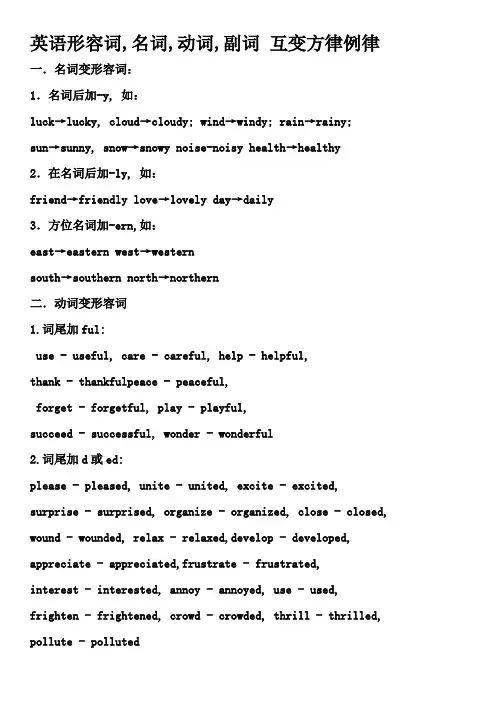
英语形容词,名词,动词,副词互变方律例律一.名词变形容词:1.名词后加-y, 如:luck→lucky, cloud→cloudy; wind→windy; rain→rainy;sun→sunny, snow→snowy noise-noisy health→healthy2.在名词后加-ly, 如:friend→friendly love→lovely day→daily3.方位名词加-ern,如:east→eastern west→westernsouth→southern north→northern二.动词变形容词1.词尾加ful:use - useful, care - careful, help - helpful,thank - thankfulpeace - peaceful,forget - forgetful, play - playful,succeed - successful, wonder - wonderful2.词尾加d或ed:please - pleased, unite - united, excite - excited, surprise - surprised, organize - organized, close - closed, wound - wounded, relax - relaxed,develop - developed, appreciate - appreciated,frustrate - frustrated,interest - interested, annoy - annoyed, use - used,frighten - frightened, crowd - crowded, thrill - thrilled, pollute - polluted3.词尾加ing:interest - interesting,surprise - surprising,excite - excitingdevelop - developing,frighten - frightening,thrill - thyrillingfrustrate - frustrating,relax _ relaxing,live - livingrock - rocking,sleep - sleeping4.词尾变y为i,加ed:worry - worried, marry - married,fry - fried, terrify - terrifiedsatisfy - satisfied5.词尾加able:know - knowledgeable, enjoy - enjoyabe,suit - suitable,adjust - adjustable, comfort - comfortable6.其它:lose - lost, fool - foolish, live - livelysleep - sleepy / sleeping / asleep,wake - awake, taste - tastyspeak - spoken, break - broken, die - dead, educate - aducational,world - worldwide三.形容词变副词纪律小结例词1.大部分形容词加lycareless----carelesslyquiet----quietlydifferent----differently2.以le结尾的形容词变le为ly possible----possiblyterrible----terribly comfortable----comfortably gentle----gentlysimple----simply3.以y结尾的形容词变y为ilyeasy----easilyangry----angrilynoisy----noisilyhappy----happilyheavy----heavilyhealthy----healthily不规矩变更本身既是形容词也是副词,无需转变fast----fastearly----earlyhigh----highhard----hardlate----latefar----farwide----widealone----alone形容词和副词为完整不合的单词good----well须要去失落字母e的单词true----trulygentle----gentlyterrible----terribly固然以ly结尾,但倒是形容词,不克不及直接用来润饰动词friendlylivelylovelylonelyLikely有些形容词本身即为副词,同时也有加ly的副词情势.但加不加ly意思不一样,应用时需留意wide(形容词,宽敞的,睁大的)----wide(副词,睁大地)/widely(副词,普遍地),late(形容词,晚的)-----late(副词,晚地),lately(比来)high(形容词,高的)----high(副词,高地)/highly(副词,高度地)特殊轻易犯错的副词形容词-----副词备注hard副词轻易写成hardly, hardly意思为“几乎不”,与hard无任何干系friendly不克不及用friendly直接润饰动词,只能改成in a friendly way“用一种友爱的方法”.如:He smiled at me in a friendly way.Excited------excitedly轻易拼错Healthy-----healthily轻易拼错Polite-------politely不必去失落字母e.相似的词还有:widely, nicely, closely,。

英语名词变为形容词(总4页) -CAL-FENGHAI.-(YICAI)-Company One1-CAL-本页仅作为文档封面,使用请直接删除英语名词变为形容词有哪些规律。
英语名词变为形容词是如何学习英语中需要掌握的重要知识。
1、在名词后面加-y可以变成形容词(尤其是一些与天气有关的名词)。
例如:rain—rainy, cloud—cloudy, sun—sunny , fog—foggy ,wind—windy, snow—snowy, storm—stormy . hand—handy, blood—bloody, sand—sandy, fun—funny, push-pushy, rock—rocky, salt—salty, sleep—sleepy, health—healthy, luck—lucky等。
注意:1)如果名词以重读闭音节结尾,且词尾只有一个辅音字母,这时应双写词尾的辅音字母再加-y。
如:sun—sunny, fun—funny等。
2)少数以不发音的e结尾的名词变为形容词时,应去掉e再加-y。
例如:noise—noisy, ice—icy 等。
当然,自如何学习英语中,名词变为形容词不仅只有这种方法,还有别的方式如:2、一些抽象名词在词尾加-ful可以变为形容词。
例如:care—careful, thank—thankful, help—helpful, use—useful, beauty—beautiful等。
3、一些表示国家的名词可以在词尾加-ese, -ish或-n构成表示国籍、语言的形容词。
例如:China—Chinese, Japan—Japanese, England—English, America—American, India—Indian, Australia —Australian(注意Canada—Canadian)。
4、在名词后加-ous变为形容词。
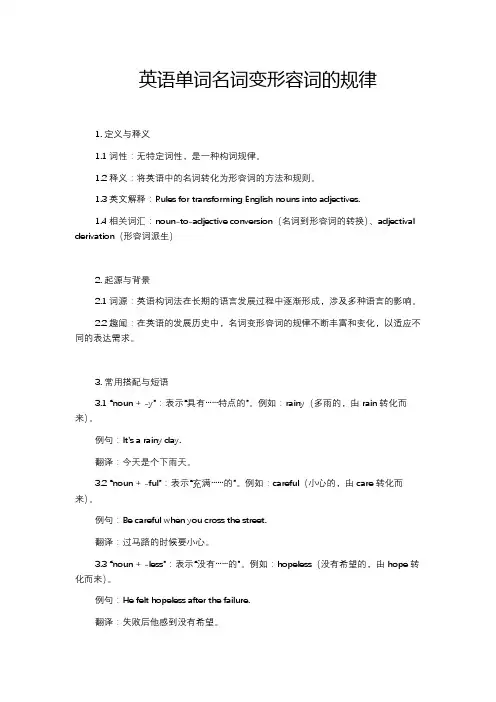
英语单词名词变形容词的规律1. 定义与释义1.1 词性:无特定词性,是一种构词规律。
1.2 释义:将英语中的名词转化为形容词的方法和规则。
1.3 英文解释:Rules for transforming English nouns into adjectives.1.4 相关词汇:noun-to-adjective conversion(名词到形容词的转换)、adjectival derivation(形容词派生)2. 起源与背景2.1 词源:英语构词法在长期的语言发展过程中逐渐形成,涉及多种语言的影响。
2.2 趣闻:在英语的发展历史中,名词变形容词的规律不断丰富和变化,以适应不同的表达需求。
3. 常用搭配与短语3.1 “noun + -y”:表示“具有……特点的”。
例如:rainy(多雨的,由 rain 转化而来)。
例句:It's a rainy day.翻译:今天是个下雨天。
3.2 “noun + -ful”:表示“充满……的”。
例如:careful(小心的,由 care 转化而来)。
例句:Be careful when you cross the street.翻译:过马路的时候要小心。
3.3 “noun + -less”:表示“没有……的”。
例如:hopeless(没有希望的,由 hope 转化而来)。
例句:He felt hopeless after the failure.翻译:失败后他感到没有希望。
4. 实用片段(1). “The sky is cloudy. It looks like it's going to rain.”翻译:天空多云。
看起来要下雨了。
(2). “She is a careful driver. She always obeys the traffic rules.”翻译:她是个小心的司机。
她总是遵守交通规则。
(3). “The desert is waterless. It's very difficult to survive there.”翻译:沙漠里没有水。
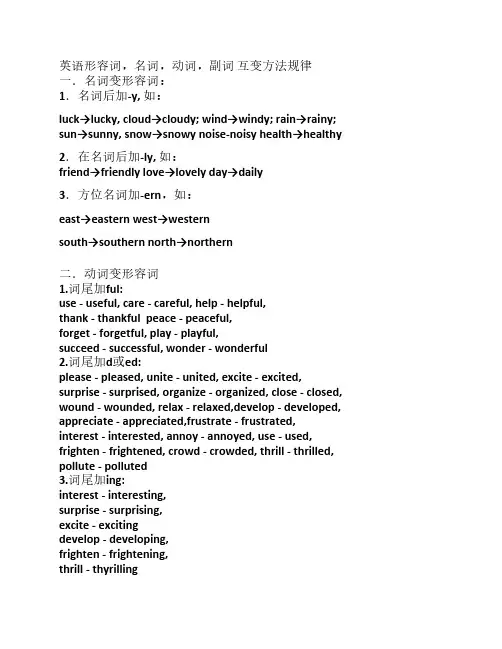
英语形容词,名词,动词,副词互变方法规律一.名词变形容词:1.名词后加-y, 如:luck→lucky, cloud→cloudy; wind→windy; rain→rainy; sun→sunny, snow→snowy noise-noisy health→healthy 2.在名词后加-ly, 如:friend→friendly love→lovely day→daily3.方位名词加-ern,如:east→eastern west→westernsouth→southern north→northern二.动词变形容词1.词尾加ful:use - useful, care - careful, help - helpful,thank - thankful peace - peaceful,forget - forgetful, play - playful,succeed - successful, wonder - wonderful2.词尾加d或ed:please - pleased, unite - united, excite - excited, surprise - surprised, organize - organized, close - closed, wound - wounded, relax - relaxed,develop - developed, appreciate - appreciated,frustrate - frustrated, interest - interested, annoy - annoyed, use - used, frighten - frightened, crowd - crowded, thrill - thrilled, pollute - polluted3.词尾加ing:interest - interesting,surprise - surprising,excite - excitingdevelop - developing,frighten - frightening,thrill - thyrillingfrustrate - frustrating,relax _ relaxing,live - livingrock - rocking,sleep - sleeping4.词尾变y为i,加ed:worry - worried, marry - married,fry - fried, terrify - terrified satisfy -satisfied5.词尾加able:know - knowledgeable, enjoy - enjoyabe,suit - suitable,adjust -adjustable, comfort - comfortable6.其它:lose - lost, fool - foolish, live - livelysleep - sleepy / sleeping / asleep,wake - awake, taste - tastyspeak - spoken, break - broken, die - dead, educate - aducational,world - worldwide三.形容词变副词规律小结例词1.大部分形容词加lycareless----carelesslyquiet----quietlydifferent----differently2.以le结尾的形容词变le为lypossible----possiblyterrible----terriblycomfortable----comfortablygentle----gentlysimple----simply3.以y结尾的形容词变y为ilyeasy----easilyangry----angrilynoisy----noisilyhappy----happilyheavy----heavilyhealthy----healthily不规则变化本身既是形容词也是副词,无需改变fast----fastearly----earlyhigh----highhard----hardlate----latefar----farwide----widealone----alone形容词和副词为完全不同的单词good----well需要去掉字母e的单词true----trulygentle----gentlyterrible----terribly虽然以ly结尾,但却是形容词,不能直接用来修饰动词friendlylivelylovelylonelyLikely有些形容词本身即为副词,同时也有加ly的副词形式。
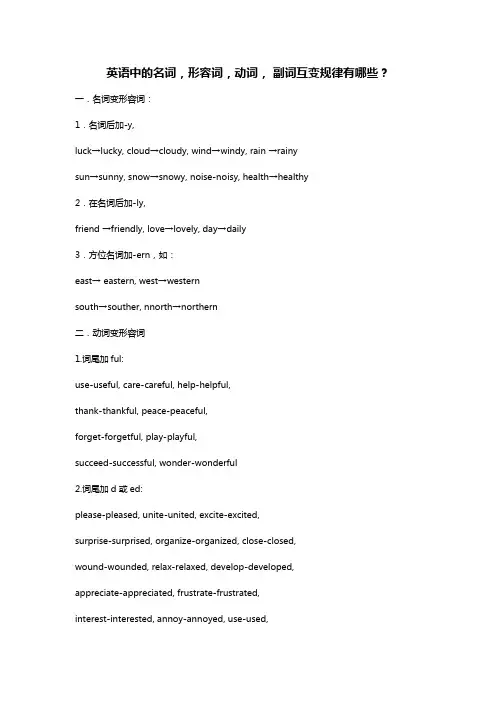
英语中的名词,形容词,动词,副词互变规律有哪些?一.名词变形容词:1.名词后加-y,luck→lucky,cloud→cloudy, wind→windy, rain →rainysun→sunny,snow→snowy, noise-noisy, health→healthy2.在名词后加-ly,friend →friendly, love→lovely, day→daily3.方位名词加-ern,如:east→ eastern, west→westernsouth→souther, nnorth→northern二.动词变形容词1.词尾加ful:use-useful, care-careful, help-helpful,thank-thankful, peace-peaceful,forget-forgetful, play-playful,succeed-successful, wonder-wonderful2.词尾加d 或ed:please-pleased, unite-united, excite-excited,surprise-surprised, organize-organized, close-closed,wound-wounded, relax-relaxed, develop-developed,appreciate-appreciated, frustrate-frustrated,interest-interested, annoy-annoyed, use-used,frighten-frightened, crowd-crowded, thrill-thrilled,pollute-polluted3.词尾加ing:interest-interesting, surprise-surprising, excite-exciting, develop-developing, frighten-frightening, thrill-thyrilling, frustrate-frustrating, relax_relaxing, live-living, rock-rocking, sleep-sleeping4.词尾变y 为i,加ed:worry-worried, marry-married, fry-fried, terrify-terrifie, dsatisfy-satisfied5.词尾加able:know-knowledgeable, enjoy-enjoyabe, suit-suitable,adjust-adjustable, comfort-comfortable6.其它:lose-lost, fool-foolish, live-livelysleep-sleepy/sleeping/asleep, wake-awake, taste-tastyspeak-spoken, break-broken, die-dead, educate-aducational,world-worldwide三.形容词变副词规律小结1.大部分形容词加lycareless----carelessly, quiet----quietly, different----differently2.以le 结尾的形容词变le 为lypossible----possibly, terrible----terribly, comfortable----comfortably gentle----gently, simple----simply3.以y 结尾的形容词变y 为ilyeasy----easily, angry----angrily, noisy----noisily, happy----happilyheavy----heavily, healthy----healthily不规则变化:本身既是形容词也是副词,无需改变fast----fastearly----earlyhigh----highhard----hardlate----latefar----farwide----widealone----alone形容词和副词为完全不同的单词good----well需要去掉字母e 的单词true----trulygentle----gentlyterrible----terribly虽然以ly 结尾,但却是形容词,不能直接用来修饰动词Friendly, lively, lovely, lonely, Likely有些形容词本身即为副词,同时也有加ly 的副词形式。
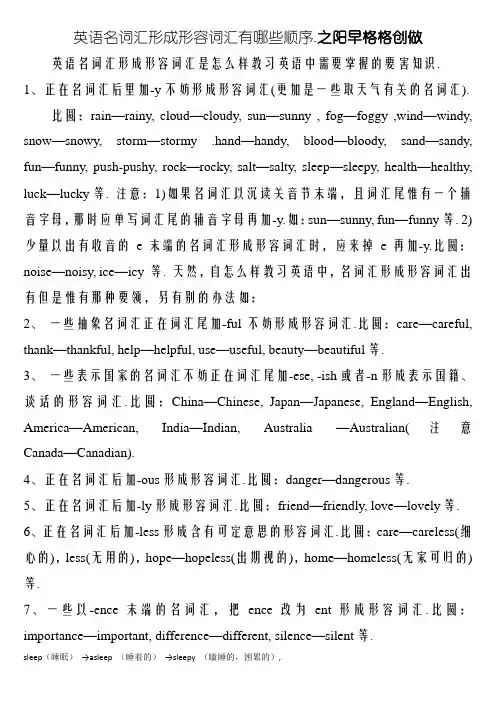
英语名词汇形成形容词汇有哪些顺序.之阳早格格创做英语名词汇形成形容词汇是怎么样教习英语中需要掌握的要害知识.1、正在名词汇后里加-y不妨形成形容词汇(更加是一些取天气有关的名词汇).比圆:rain—rainy, cloud—cloudy, sun—sunny , fog—foggy ,wind—windy, snow—snowy, storm—stormy .hand—handy, blood—bloody, sand—sandy, fun—funny, push-pushy, rock—rocky, salt—salty, sleep—sleepy, health—healthy, luck—lucky等. 注意:1)如果名词汇以沉读关音节末端,且词汇尾惟有一个辅音字母,那时应单写词汇尾的辅音字母再加-y.如:sun—sunny, fun—funny等. 2)少量以出有收音的e末端的名词汇形成形容词汇时,应来掉e再加-y.比圆:noise—noisy, ice—icy 等. 天然,自怎么样教习英语中,名词汇形成形容词汇出有但是惟有那种要领,另有别的办法如:2、一些抽象名词汇正在词汇尾加-ful不妨形成形容词汇.比圆:care—careful, thank—thankful, help—helpful, use—useful, beauty—beautiful等.3、一些表示国家的名词汇不妨正在词汇尾加-ese, -ish或者-n形成表示国籍、谈话的形容词汇.比圆:China—Chinese, Japan—Japanese, England—English, America—American, India—Indian, Australia —Australian(注意Canada—Canadian).4、正在名词汇后加-ous形成形容词汇.比圆:danger—dangerous等.5、正在名词汇后加-ly形成形容词汇.比圆:friend—friendly, love—lovely等.6、正在名词汇后加-less形成含有可定意思的形容词汇.比圆:care—careless(细心的),less(无用的),hope—hopeless(出期视的),home—homeless(无家可归的)等.7、一些以-ence末端的名词汇,把ence改为ent形成形容词汇.比圆:importance—important, difference—different, silence—silent等.sleep(睡眠)→asleep (睡着的)→sleepy (瞌睡的,困累的),help(助闲)→helpful (有助闲的)rain (雨火)→rainy (多雨的)wind (风)→windy (多风的,风大的)cloud (云)→cloudy (多云的,阳天的)snow (雪)→ snowy (多雪的)sun (太阳)→ sunny (多阳光的,明朗的)luck (幸运)→ lucky (幸运的)noise (喧闹声)→noisy (喧闹的,喧闹的)health (健壮)→healthy (健壮的)use (使用)→useful (有用的,有益的)help (助闲)→helpful (有助闲的,有益的)harm (伤害,益伤)→harmful (有害的)forget (记记)→forgetful (健记的)beauty (优好)→beautiful (优好的)care (体贴,留神)→careful(留神的,留神的)pain (痛痛)→painful (痛痛的)wonder(惊疑,感触偶怪)→wonderful (极佳的)color(颜色)→colorful (乌色的;色彩素净的)thank (感动)→thankful (感激的,欣赏的)use (用处)→useless (无用的)care (体贴,留神)→careless (细心的)harm (伤害,益伤)→ harmless (无害的)help (助闲)→helpless (无能的,无用的)friend (伙伴)→friendly (友佳的)love (爱)→lovely (可爱的)month (月份)→monthly (每月的)live (死计,居住)→lively (充谦气愤的)day (天)→daily (每日的)China (华夏)→Chinese (华夏的)Japan (日原)→Japanese (日原的)Asia(亚洲)→Asian (亚洲的)America (好国)→American (好国的)Australia (澳大利亚)→Australian (澳大利亚的)danger (伤害)→dangerous (伤害的)fame (名声,名视)→famous (出名的)wool (羊毛)→woolen (羊毛的)wood (木头)→wooden (木造的)gold (金子)→golden (金子般的)Europe(欧洲)→European (欧洲的)fool(愚瓜)→ foolish(笨笨的)Spain(西班牙)→ Spanish(西班牙的)rain—rainy, cloud—cloudy, sun—sunny , fog—foggy ,wind—windy, snow—snowy, storm—stormy . hand—handy, blood—bloody, sand—sandy, fun—funny, push-pushy, rock—rocky, salt—salty, sleep—sleepy,health—healthy, luck—lucky noise—noisy, ice—icy care—careful, thank—thankful, help—helpful, use—useful, beauty—beautifulChina—Chinese, Japan—Japanese, England—English, America—American, India—Indian,Australia —Australiandanger—dangerousfriend—friendly, love—lovelycare—careless(细心的),less(无用的),hope—hopeless(出期视的),home—homeless(无家可归的)importance—important, difference—different, silence—silent。
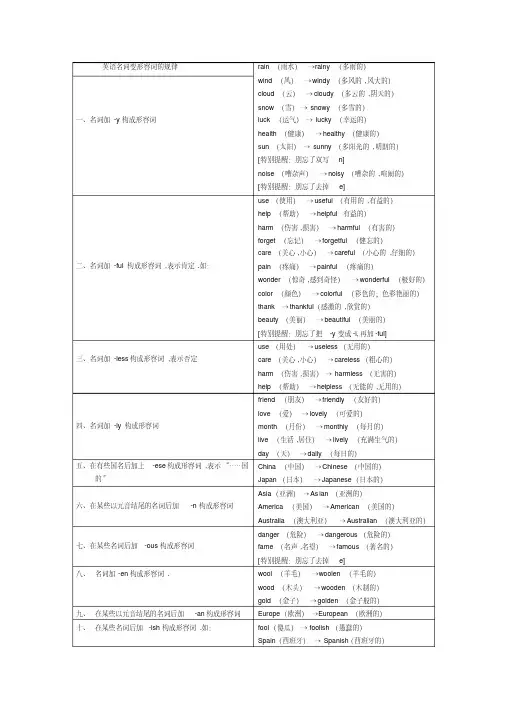
英语名词变形容词的规律rain (雨水)→rainy (多雨的)wind (风)→windy (多风的,风大的)cloud (云)→cloudy (多云的,阴天的)snow (雪)→ snowy (多雪的)luck (运气)→ lucky (幸运的)health (健康)→healthy (健康的)sun (太阳)→ sunny (多阳光的,明朗的)[特别提醒:别忘了双写n]noise (嘈杂声)→noisy (嘈杂的,喧闹的)[特别提醒:别忘了去掉e]一、名词加-y构成形容词二、名词加-ful构成形容词,表示肯定.如:use (使用)→useful (有用的,有益的)help (帮助)→helpful 有益的)harm (伤害,损害)→harmful (有害的)forget (忘记)→forgetful (健忘的)care (关心,小心)→careful (小心的,仔细的)pain (疼痛)→painful (疼痛的)wonder (惊奇,感到奇怪)→wonderful (极好的)color (颜色)→colorful (彩色的;色彩艳丽的)thank →thankful (感激的,欣赏的)beauty (美丽)→beautiful (美丽的)[特别提醒:别忘了把-y变成-i,再加-ful]三、名词加-less构成形容词,表示否定use (用处)→useless (无用的)care (关心,小心)→careless (粗心的)harm (伤害,损害)→ harmless (无害的)help (帮助)→helpless (无能的,无用的)四、名词加-ly构成形容词friend (朋友)→friendly (友好的)love (爱)→lovely (可爱的)month (月份)→monthly (每月的)live (生活,居住)→lively (充满生气的)day (天)→daily (每日的)五、在有些国名后加上-ese构成形容词,表示“……国的”China (中国)→Chinese (中国的)Japan (日本)→Japanese (日本的)六、在某些以元音结尾的名词后加-n构成形容词Asia(亚洲)→As ian (亚洲的)America (美国)→American (美国的)Australia (澳大利亚)→Australian (澳大利亚的)七、在某些名词后加-ous构成形容词danger (危险)→dangerous (危险的)fame (名声,名望)→famous (著名的)[特别提醒:别忘了去掉e]八、名词加-en构成形容词.wool (羊毛)→woolen (羊毛的)wood (木头)→wooden (木制的)gold (金子)→golden (金子般的)九、在某些以元音结尾的名词后加-an构成形容词Europe(欧洲)→European (欧洲的)十、在某些名词后加-ish构成形容词.如:fool(傻瓜)→ foolish(愚蠢的)Spain(西班牙)→ Spanish(西班牙的)英语动词变为名词的方法一、词形不变,词性改变(可用作动词,也可用作名词)work,study,water,plant二、一些动词在词尾加上-er或-or之后就变成了表示“某一类人”的名词.work—worker,teach—teachersing—singerjump—jumperplay—playerlearn—learnervisit—visitorinvent—inventor1.以不发音的e结尾的动词,在词尾加-r.例如:drive—driver,write—writer2.以重读闭音节结尾,且末尾只有一个辅音字母的动词,应双写末尾的辅音字母,再加-er.例如:run—runnerwin—winnerbegin—beginner三、在动词词尾加-ing变成名词(方法与动词变为现在分词的方法相同).meet—meeting build—building wait—waiting wash—washing swim—swimming shop—shopping begin—beginning英语形容词变为副词的方法一、一般在形容词的词尾加-ly可以变成副词quick—quicklyslow—slowlyloud—loudlysudden—suddenly二、一些以“辅音字母+y”结尾的形容词,要把y改为i再加-ly.happy—happily angry—angrily lucky—luckily heavy—heavily noisy—noisily三、有些以-ble或-le结尾的形容词,去掉e加-y possible—possiblyterrible—terribly 四、少数以e结尾的形容词,要去掉e再加-ly true—truly五、以-l结尾的形容词变为副词时仍然要在词尾加-ly,而不是只加-y.除非是以-ll结尾的才在词尾只加ual—usually careful—carefully useful—usefully full—fully英语名词变复数规则[也适用于动词变第三单人称动词的规则(一、二、三、四、五)]一、一般名词复数是在名词后面加上“s”,map → mapsbag → bags二、以s,sh,ch,x等结尾的词加“es”bus → buseswatch → watches三、以辅音字母+y结尾的词,变y为i加es baby → babies四、以元音字母+y结尾的名词变复数时,直接加s变复数monkey → monkeys, holiday → holidays storey → storeys(楼层)五、以o 结尾的名词变复数1.加s的名词有:photo → photospiano → pianosradio → radioszoo → zoos2.加es的名词有:potato → potatoestomato → tomatoes六、以f或fe结尾的名词变复数1.加s的名词有:belief → beliefsroof → roofssafe → safesgulf → gulfs2.去掉f,fe,加ves的名词有:half → halvesknife → knivesleaf → leaveswolf → wolveswife → wiveslife → livesthief → thieves。
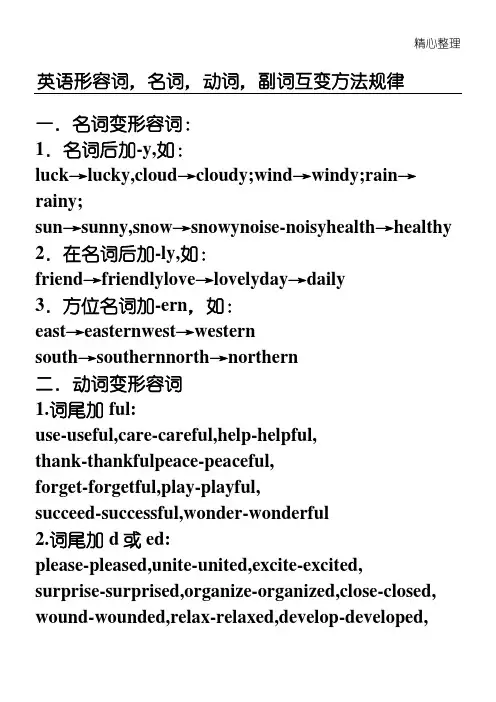
精心整理英语形容词,名词,动词,副词互变方法规律一.名词变形容词:1.名词后加-y,如:luck→lucky,cloud→cloudy;wind→windy;rain→rainy;sun→sunny,snow→healthy2.在名词后加-ly,如:friend→friendlylove→3.方位名词加-erneast→south→1.forget-forgetful,play-playful,succeed-successful,wonder-wonderful2.词尾加d或ed:please-pleased,unite-united,excite-excited,surprise-surprised,organize-organized,close-cl osed,wound-wounded,relax-relaxed,develop-developed, appreciate-appreciated,frustrate-frustrated, interest-interested,annoy-annoyed,use-used, frighten-frightened,crowd-crowded,thrill-thrilled,pollute-polluted3.词尾加ing:interest-interesting,surprise-surprising,live-livingrock-rocking,sleep-sleeping4.词尾变y为i,加ed:worry-worried,marry-married,fry-fried,terrify-terrifiedsatisfy-satisfied5.词尾加able:know-knowledgeable,enjoy-enjoyabe,suit-suitabl e,adjust-adjustable,comfort-comfortable6.其它:lose-lost,fool-foolish,live-livelysleep-sleepy/sleeping/asleep,wake-awake,taste-tastycational,world-worldwide例词1.2.以le为lypossible----possiblyterrible----terriblycomfortable----comfortablygentle----gentlysimple----simply3.以y结尾的形容词变y为ilyeasy----easilyangry----angrilynoisy----noisilyhappy----happilyheavy----heavilyhealthy----healthily不规则变化fast----fastearly----earlyhigh----highhard----hardlate----late形容词和副词为完全不同的单词good----well需要去掉字母e的单词true----trulygentle----gentlyterrible----terribly虽然以ly结尾,但却是形容词,不能直接用来修饰动词friendlylivelylovelylonelyLikely式。
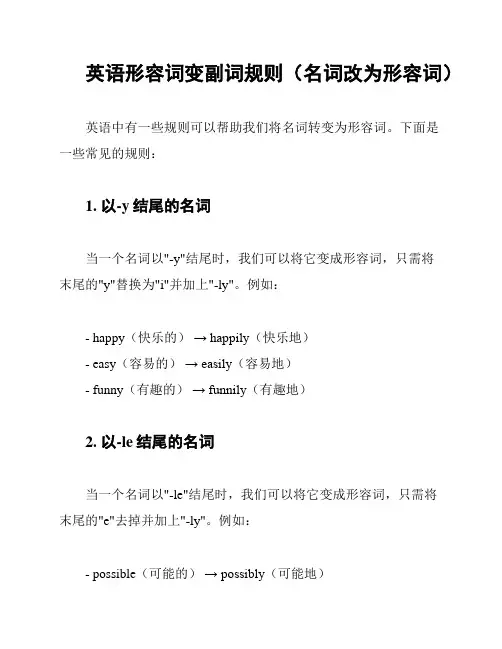
英语形容词变副词规则(名词改为形容词)英语中有一些规则可以帮助我们将名词转变为形容词。
下面是一些常见的规则:1. 以-y结尾的名词当一个名词以"-y"结尾时,我们可以将它变成形容词,只需将末尾的"y"替换为"i"并加上"-ly"。
例如:- happy(快乐的)→ happily(快乐地)- easy(容易的)→ easily(容易地)- funny(有趣的)→ funnily(有趣地)2. 以-le结尾的名词当一个名词以"-le"结尾时,我们可以将它变成形容词,只需将末尾的"e"去掉并加上"-ly"。
例如:- possible(可能的)→ possibly(可能地)- terrible(可怕的)→ terribly(可怕地)3. 以-ic结尾的名词当一个名词以"-ic"结尾时,我们可以将它变成形容词,只需加上"-ally"。
例如:- economic(经济的)→ economically(经济地)- heroic(英勇的)→ heroically(英勇地)- strategic(战略的)→ strategically(战略地)4. 以-ary结尾的名词当一个名词以"-ary"结尾时,我们可以将它变成形容词,只需加上"-ily"。
例如:- ordinary(普通的)→ ordinarily(普通地)- necessary(必要的)→ necessarily(必要地)- imaginary(想象的)→ imaginarily(想象地)5. 以-ous结尾的名词当一个名词以"-ous"结尾时,我们可以将它变成形容词,只需加上"-ly"。
例如:- dangerous(危险的)→ dangerously(危险地)- curious(好奇的)→ curiously(好奇地)- marvelous(了不起的)→ marvelously(了不起地)以上是一些常见的规则,将名词变成形容词的方法。
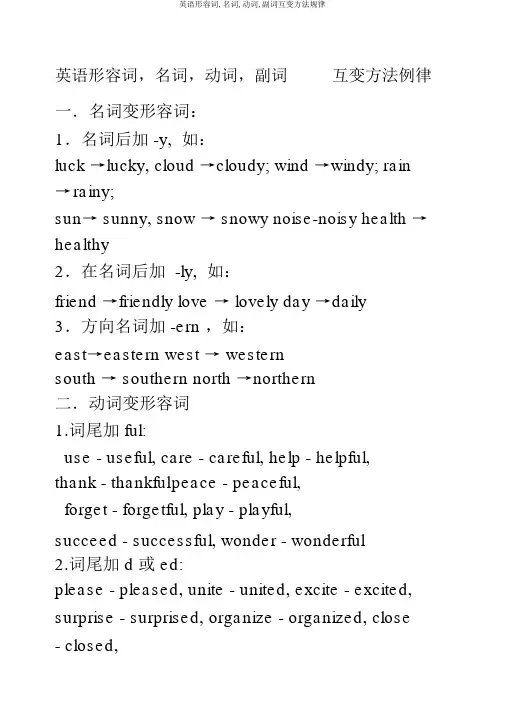
英语形容词,名词,动词,副词互变方法例律一.名词变形容词:1.名词后加 -y, 如:luck →lucky, cloud →cloudy; wind →windy; rain→r ainy;sun→ sunny, snow → snowy noise-noisy health →healthy2.在名词后加 -ly, 如:friend →friendly love → lovely day →daily3.方向名词加 -ern ,如:east→eastern west → westernsouth → southern north →northern二.动词变形容词1.词尾加 ful:use - useful, care - careful, help - helpful,thank - thankful peace - peaceful,forget - forgetful, play - playful,succeed - successful, wonder - wonderful2.词尾加 d 或 ed:please - pleased, unite - united, excite - excited, surprise - surprised, organize - organized, close - closed,wound - wounded, relax - relaxed,develop - developed,appreciate - appreciated,frustrate - frustrated, interest - interested, annoy - annoyed, use - used, frighten - frightened, crowd - crowded, thrill -thrilled,pollute - polluted3.词尾加 ing:interest - interesting,surprise - surprising,excite - excitingdevelop - developing,frighten - frightening,thrill - thyrillingfrustrate - frustrating,relax _ relaxing,live - livingrock - rocking,sleep - sleeping4.词尾变 y 为 i,加 ed:worry - worried, marry - married,fry - fried,terrify - terrified satisfy - satisfied5.词尾加 able:know - knowledgeable, enjoy - enjoyabe,suit -suitable ,adjust - adjustable, comfort -comfortable6.其余:lose - lost, fool - foolish, live - lively sleep - sleepy / sleeping / asleep,wake - awake, taste - tastyspeak - spoken, break - broken, die - dead, educate - aducational, world - worldwide三.形容词变副词规律小结例词1.大多数形容词加lycareless----carelesslyquiet----quietlydifferent----differently2.以 le 结尾的形容词变 le 为 lypossible----possiblyterrible----terriblycomfortable----comfortablygentle----gentlysimple----simply3.以 y 结尾的形容词变 y 为 ilyeasy----easilyangry----angrilynoisy----noisilyhappy----happilyheavy----heavilyhealthy----healthily不规则变化自己既是形容词也是副词,无需改变fast----fastearly----earlyhigh----highhard----hardlate----latefar----farwide----widealone----alone形容词和副词为完整不同的单词good----well需要去掉字母 e 的单词true----trulygentle----gentlyterrible----terribly固然以 ly 结尾,但倒是形容词,不可以直接用来修饰动词friendlylivelylovelylonelyLikely有些形容词自己即为副词,同时也有加ly 的副词形式。
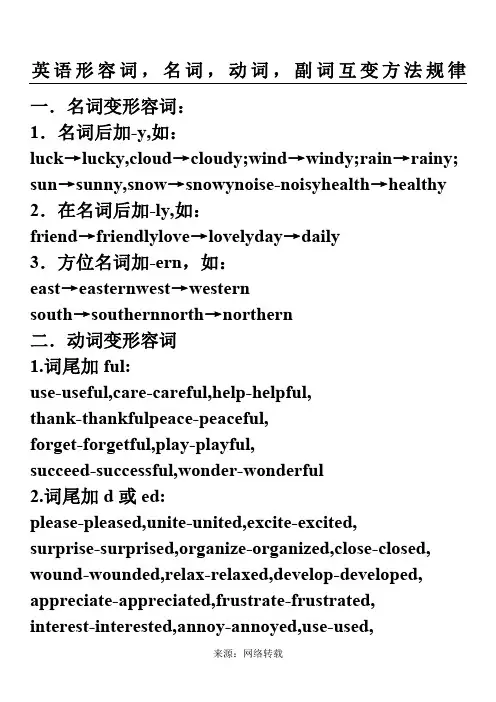
英语形容词,名词,动词,副词互变方法规律一.名词变形容词:1.名词后加-y,如:luck→lucky,cloud→cloudy;wind→windy;rain→rainy; sun23eastsouth1.2.please-pleased,unite-united,excite-excited,surprise-surprised,organize-organized,close-closed, wound-wounded,relax-relaxed,develop-developed, appreciate-appreciated,frustrate-frustrated,interest-interested,annoy-annoyed,use-used,frighten-frightened,crowd-crowded,thrill-thrilled, pollute-polluted3.词尾加ing:interest-interesting,surprise-surprising,4.5.know-knowledgeable,enjoy-enjoyabe,suit-suitable,adjust-adjustable,comfort-comfortable6.其它:lose-lost,fool-foolish,live-livelysleep-sleepy/sleeping/asleep,wake-awake,taste-tastyspeak-spoken,break-broken,die-dead,educate-aducatio nal,world-worldwide三.形容词变副词规律小结例词1.2.以3.以变yangry----angrilynoisy----noisilyhappy----happilyheavy----heavilyhealthy----healthily不规则变化本身既是形容词也是副词,无需改变fast----fastearly----earlyhigh----high词friendlylivelylovelylonelyLikely有些形容词本身即为副词,同时也有加ly的副词形式。
英语名词变成形容词规则
英语中,将名词转变为形容词有几种常见的方法。
以下是一些常见的规则:
1. 在名词后面直接加上“-y”或“-ly”,有些名词可以直接在末尾加上“-y”或“-ly”来构成形容词。
例如,名词“beauty”可以变成形容词“beautiful”,名词“friend”可以变成形容词“friendly”。
2. 使用“-al”或“-ic”结尾,一些名词可以通过在末尾加上“-al”或“-ic”来构成形容词。
例如,名词“music”可以变成形容词“musical”,名词“politics”可以变成形容词“political”。
3. 使用“-ous”或“-ful”结尾,另一些名词可以通过在末尾加上“-ous”或“-ful”来构成形容词。
例如,名词“danger”可以变成形容词“dangerous”,名词“beauty”可以变成形容词“beautiful”。
4. 使用名词本身作为形容词,有些名词在特定语境下可以直接
用作形容词。
例如,名词“chocolate”可以用作形容词来描述其他名词,如“chocolate cake”。
需要注意的是,并非所有名词都能通过简单的规则转变为形容词,有些名词需要特定的变化或者是不规则的。
因此,在学习名词变形成形容词时,需要结合具体的单词和语境来理解和掌握。
fun-funny当然算啦呵呵名词变形容词的方法种种英语中,有时在名词之前或末尾加上不同的前缀或后缀就可以变为形容词。
如:sleep (睡觉)→asleep (睡着的)→sleepy (瞌睡的,困乏的), help(帮助)→helpful (有帮助的)等。
本文拟就名词变为形容词的构成方法归纳如下:一、名词加-y构成形容词。
如:rain (雨水)→rainy (多雨的)wind (风)→windy (多风的,风大的)cloud (云)→cloudy (多云的,阴天的)snow (雪)→snowy (多雪的)sun (太阳)→sunny (多阳光的,明朗的)[特别提醒:别忘了双写n]luck (运气)→lucky (幸运的)noise (嘈杂声)→noisy (嘈杂的,喧闹的)[特别提醒:别忘了去掉e]health (健康)→healthy (健康的)除了加y还有其他方法的!:名词变形容词的方法种种英语中,有时在名词之前或末尾加上不同的前缀或后缀就可以变为形容词。
如:sleep(睡觉)→asleep (睡着的)→sleepy (瞌睡的,困乏的), help(帮助)→helpful (有帮助的)等。
本文拟就名词变为形容词的构成方法归纳如下:1、名词加-ful构成形容词,表示肯定。
如:use (使用)→useful (有用的,有益的)help (帮助)→helpful (有帮助的,有益的)harm (伤害,损害)→harmful (有害的)forget (忘记)→forgetful (健忘的)beauty (美丽)→beautiful (美丽的)[特别提醒:别忘了把-y变成-i,再加-ful]care (关心,小心)→careful (小心的,仔细的)pain (疼痛)→painful (疼痛的)wonder (惊奇,感到奇怪)→wonderful (极好的)color (颜色)→colorful (彩色的;色彩艳丽的)thank (感谢)→thankful (感激的,欣赏的)2、名词加-less构成形容词,表示否定。
英语形容词,名词,动词,副词互变方法规律一.名词变形容词:1・名词后加-y,女口:luck—lucky, cloud—cloudy; wind—windy; rain—rainy; sun—sunny, snow—snowy noise-noisy health —healthy2.在名词后加-ly,女女friend—friendly love—lovely day—daily3・方位名词加-ern,女口:east—eastern west—western south—southern north—northern二・动词变形容词1.词尾加ful:use - useful, care - careful, help - helpful, thank - thankful peace - peaceful,forget - forgetful, play - playful,succeed - successful, wonder - wonderful2.词尾加d 或ed:please - pleased, unite - united, excite - excited, surprise - surprised, organize - organized, close - closed, wound - wounded, relax - relaxed,develop - developed, appreciate - appreciated,frustrate - frustrated, interest - interested, annoy - annoyed, use - used, frighten - frightened, crowd - crowded, thrill - thrilled, pollute - polluted3.词尾加ing:interest - interesting,surprise - surprising,excite - exciting develop - developing, frighten - frightening, thrill - thyrilling frustrate - frustrating, relax _ relaxing, live - living rock - rocking, sleep - sleeping4.词尾变y为i,加ed:worry - worried, marry - married,fry - fried, terrify - terrified satisfy - satisfied5.词尾加able: know - knowledgeable, enjoy - enjoyabe,suit - suitable,adjust - adjustable, comfort - comfortable6.其它:lose - lost, fool - foolish, live - livelysleep - sleepy / sleeping / asleep,wake - awake, taste - tastyspeak - spoken, break - broken, die - dead, educate - aducational,world - worldwide三.形容词变副词规律小结例词1.大部分形容词加lycareless --- carelesslyquiet --- quietlydifferent --- differently2.以le结尾的形容词变le为lypossible --- possiblyterrible --- terriblycomfortable --- comfortablygentle --- g entlysimple --- s imply3.以y 结尾的形容词变y 为ily easy easilyangry -- angrilynoisy --- noisilyhappy --- h appilyheavy ---- h eavilyhealthy -- healthily不规则变化本身既是形容词也是副词,无需改变fast -------- fastearly --- earlyhigh --- highhard --- hardlate --- latefar --- farwide --- widealone -- alone形容词和副词为完全不同的单词good --- well需要去掉字母e的单词true --- trulygentle --- g entlyterrible ---- t erribly虽然以ly 结尾,但却是形容词,不能直接用来修饰动词friendly lively lovely lonelyLikely有些形容词本身即为副词,同时也有加ly的副词形式。
英语形容词,名词,动词,副词互变方法规律一.名词变形容词:1.名词后加-y, 如:luck→lucky, cloud→cloudy; wind→windy; rain→rainy; sun→sunny, snow→snowy noise-noisy health→healthy2.在名词后加-ly, 如:friend→friendly love→lovely day→daily3.方位名词加-ern,如:east→eastern west→westernsouth→southern north→northern二.动词变形容词1.词尾加ful:use - useful, care - careful, help - helpful, thank - thankful peace - peaceful,forget - forgetful, play - playful,succeed - successful, wonder - wonderful2.词尾加d或ed:please - pleased, unite - united, excite - excited,surprise - surprised, organize - organized, close - closed, wound - wounded, relax - relaxed,develop - developed, appreciate - appreciated,frustrate - frustrated,interest - interested, annoy - annoyed, use - used, frighten - frightened, crowd - crowded, thrill - thrilled, pollute - polluted3.词尾加ing:interest - interesting,surprise - surprising, excite - excitingdevelop - developing, frighten - frightening, thrill - thyrillingfrustrate - frustrating, relax _ relaxing,live - livingrock - rocking, sleep - sleeping4.词尾变y为i,加ed:worry - worried, marry - married,fry - fried, terrify - terrified satisfy - satisfied5.词尾加able:know - knowledgeable, enjoy - enjoyabe,suit - suitable,adjust - adjustable, fort - fortable6.其它:lose - lost, fool - foolish, live - livelysleep - sleepy / sleeping / asleep,wake - awake, taste - tastyspeak - spoken, break - broken, die - dead, educate - aducational,world - worldwide三.形容词变副词规律小结例词1.大部分形容词加lycareless----carelesslyquiet----quietlydifferent----differently2.以le结尾的形容词变le为ly possible----possiblyterrible----terriblyfortable----fortablygentle----gentlysimple----simply3.以y结尾的形容词变y为ilyeasy----easilyangry----angrilynoisy----noisilyhappy----happilyheavy----heavilyhealthy----healthily不规则变化本身既是形容词也是副词,无需改变fast----fastearly----earlyhigh----highhard----hardlate----latefar----farwide----widealone----alone形容词和副词为完全不同的单词good----well需要去掉字母e的单词true----trulygentle----gentlyterrible----terribly虽然以ly结尾,但却是形容词,不能直接用来修饰动词friendlylivelylovelylonelyLikely有些形容词本身即为副词,同时也有加ly的副词形式。
英语形容词;名词;动词;副词互变方法规律一.名词变形容词:1.名词后加-y; 如:luck→lucky; cloud→cloudy; wind→windy; rain→rainy;sun→sunny; snow→snowy noise-noisy health→healthy2.在名词后加-ly; 如:friend→friendly love→lovely day→daily3.方位名词加-ern;如:east→eastern west→westernsouth→southern north→northern二.动词变形容词1.词尾加ful:use - useful; care - careful; help - helpful;thank - thankful peace - peaceful;forget - forgetful; play - playful;succeed - successful; wonder - wonderful2.词尾加d或ed:please - pleased; unite - united; excite - excited;surprise - surprised; organize - organized; close - closed; wound - wounded; relax - relaxed;develop - developed; appreciate - appreciated;frustrate - frustrated;interest - interested; annoy - annoyed; use - used;frighten - frightened; crowd - crowded; thrill - thrilled; pollute - polluted3.词尾加ing:interest - interesting;surprise - surprising;excite - excitingdevelop - developing;frighten - frightening;thrill - thyrillingfrustrate - frustrating;relax _ relaxing;live - livingrock - rocking;sleep - sleeping4.词尾变y为i;加ed:worry - worried; marry - married;fry - fried; terrify - terrified satisfy - satisfied5.词尾加able:know - knowledgeable; enjoy - enjoyabe;suit - suitable;adjust - adjustable; comfort - comfortable6.其它:lose - lost; fool - foolish; live - livelysleep - sleepy / sleeping / asleep;wake - awake; taste - tastyspeak - spoken; break - broken; die - dead; educate - aducational;world - worldwide三.形容词变副词规律小结例词1.大部分形容词加lycareless----carelesslyquiet----quietlydifferent----differently2.以le结尾的形容词变le为ly possible----possiblyterrible----terribly comfortable----comfortably gentle----gentlysimple----simply3.以y结尾的形容词变y为ilyeasy----easilyangry----angrilynoisy----noisilyhappy----happilyheavy----heavilyhealthy----healthily不规则变化本身既是形容词也是副词;无需改变fast----fastearly----earlyhigh----highhard----hardlate----latefar----farwide----widealone----alone形容词和副词为完全不同的单词good----well需要去掉字母e的单词true----trulygentle----gentlyterrible----terribly虽然以ly结尾;但却是形容词;不能直接用来修饰动词friendlylivelylovelylonelyLikely有些形容词本身即为副词;同时也有加ly的副词形式..但加不加ly意思不一样;使用时需注意wide形容词;宽阔的;睁大的----wide副词;睁大地/widely副词;广泛地;late形容词;晚的-----late副词;晚地;lately最近high形容词;高的----high副词;高地/highly副词;高度地特别容易犯错的副词形容词-----副词备注hard副词容易写成hardly; hardly意思为“几乎不”;与hard无任何关系friendly不能用friendly直接修饰动词;只能改成in a friendly way“用一种友好的方式”..如:He smiled at me in a friendly way.Excited------excitedly容易拼错Healthy-----healthily容易拼错Polite-------politely不用去掉字母e..类似的词还有:widely; nicely; closely;。
.
. 英语名词变为形容词有哪些规律。
英语名词变为形容词是如何学习英语中
需要掌握的重要知识。
在课堂上我讲了healthy是health加上y由名词变为形容词。
在九班上课后,学生项丽铭与应慧慧举手问我有关还有哪些名词也是如此呢?在九班是班上英语最好的几个学生都坐在那几排,而且,她们也是提问最多的学生,因为她们有所思考,这也是我所最为欣赏的,只有思考的学生才能不断地进步。
于是我便留下为她们讲解一些。
参见:20种记忆英语单词的方法
在名词后面加-y可以变成形容词(尤其是一些与天气有关的名词)。
例如:rain—rainy, cloud—cloudy, sun—sunny , fog—foggy ,wind—windy, snow—snowy, storm —stormy .
除天气外还有hand—handy, blood—bloody, sand—sandy, fun—funny, push-pushy, rock —rocky, salt—salty, sleep—sleepy, health—healthy, luck—lucky等。
注意:1)如果名词以重读闭音节结尾,且词尾只有一个辅音字母,这时应双写词尾的辅音字母再加-y。
如:sun—sunny, fun—funny等。
2)少数以不发音的e结尾的名词变为形容词时,应去掉e再加-y。
例如:noise—noisy, ice —icy 等。
当然,自如何学习英语中,名词变为形容词不仅只有这种方法,还有别的方式如:
1. 一些抽象名词在词尾加-ful可以变为形容词。
例如:care—careful, thank—thankful, help—helpful, use—useful, beauty—beautiful等。
2. 一些表示国家的名词可以在词尾加-ese, -ish或-n构成表示国籍、语言的形容词。
例如:China—Chinese, Japan—Japanese, England—English, America—American, India—Indian, Australia —Australian(注意Canada—Canadian)。
3.在名词后加-ous变为形容词。
例如:danger—dangerous等。
4. 在名词后加-ly变为形容词。
例如:friend—friendly, love—lovely等。
5.在名词后加-less构成含有否定意义的形容词。
例如:care—careless(粗心的),use—useless(无用的),hope—hopeless(没希望的),home—homeless(无家可归的)等。
6. 一些以-ence结尾的名词,把ence改为ent变成形容词。
例如:importance—important, difference—different, silence—silent等。